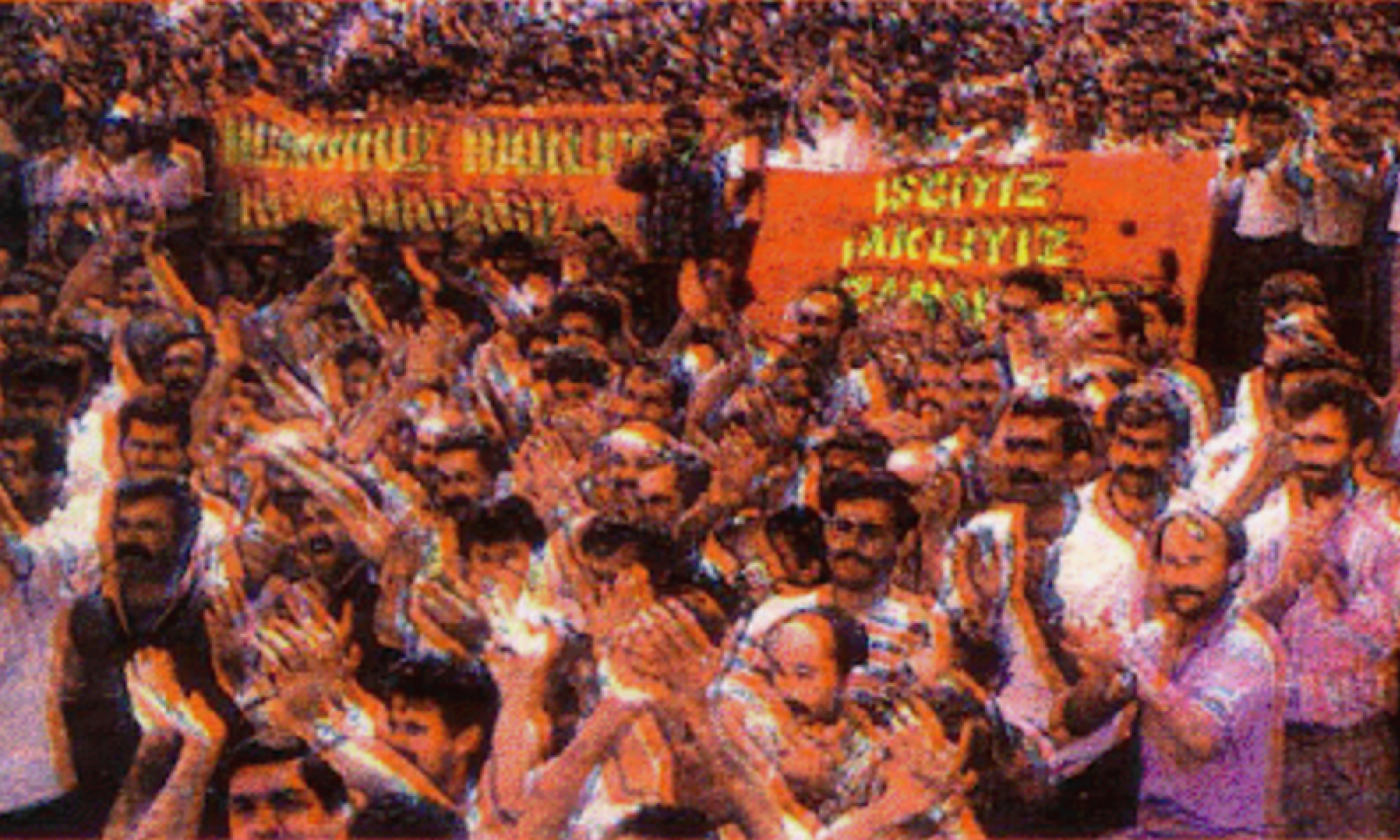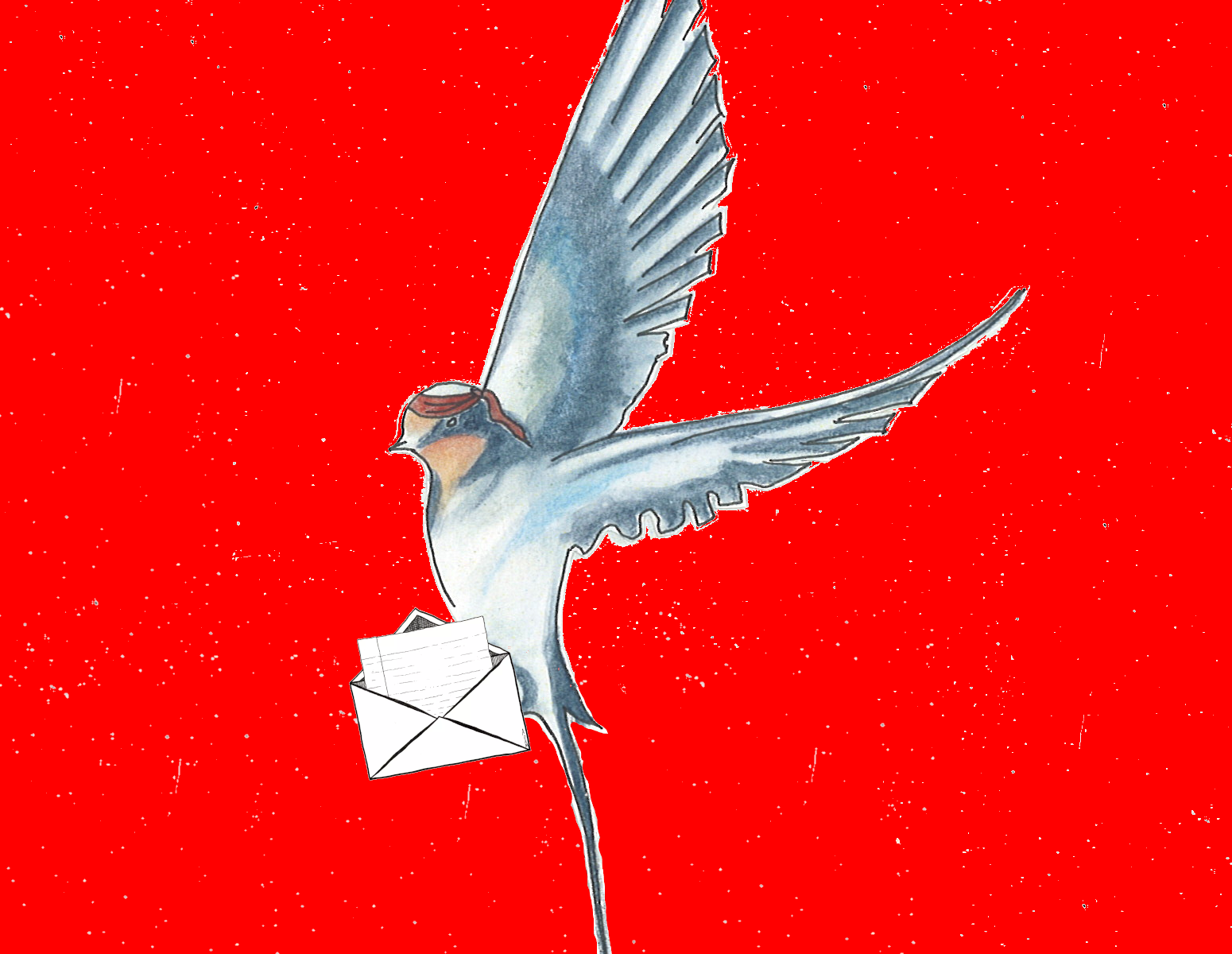This article is also available in German
This letter was recently sent by Özgül Emre from Rohrbach Prison of Germany to her lawyer and translated from Turkish into English. Özgül is a revolutionary from Turkey who was arrested in Germany on 16th of May 2022 and is accused of being a member of a terrorist organisation. During the high point of revolutionary struggle of Turkey in 1990s, she worked as a journalist in Kurtuluş Magazine. As an exiled revolutionary in Germany, she worked in wide range of committees; from anti-drug committees to anti-racism committees. The attacks of German state didn’t stopped with this mafia like kidnapping. From the detention onward, they forced prison uniforms on Özgül Emre in Rohrbach prison. German state knows very well that Revolutionaries do NOT and NEVER wear prison uniforms. In 1984, 4 revolutionaries died as a result of hunger strike to oppose the introduction of prison uniforms in prisons of Turkey. Until this day, there is no prison uniforms thanks to 4 martyrs. Özgül Emre comes from this uncompromising tradition to keep up the identity, integrity and dignity of being a revolutionary. As the oppression to enforce prison uniforms is not enough, Rohrbach prison is tried to kill her with not supplying salt and sugar for the first 30 days of hunger strike. They only supplied one piece of sugar with tea every evening, which obviously is not enough. Without the supplements like salt and sugar in proper dose, it is very easy for a person die in hunger strike at any stage. Around the day 40, she got hospitalised and on 44th day of the hunger strike she won the struggle against the torturers and received her own clothes, luckily without any long term damage to her body. In this letter, she describes the torture methods of the prison authorities, who do not provide her with sanitary conditions and privacy.
“How are you doing? How are all our people? I am doing very well because of my determination of being righteous – despite the political and legal siege against me. The trial against me, as well as my imprisonment, are, from my point of view, unlawful and also contrary to the law. Although my place of residence is known and I had an appointment at a government office on the very day of my arrest, it was pretended that I could not be found, that I would never go to my apartment, and so I was kidnapped on the basis of lies in the street. The purpose was to make me look like the guilty. Because they could not have justified my arrest and pre-trial detention any other way. The trial against me could have taken place without pre-trial detention.
So that is how I was arrested. I was arrested because I conveyed the truths to the peoples in Turkey and all over the world. On the one hand, this truth had to be prevented, and at the same time, my identity, my personality had to be humiliated. It was also necessary to make an example of those who participate in the anti-fascist and anti-imperialist struggle. They say: “If you participate in the democratic struggle against fascism, you too can end up like this. It doesn’t matter if you are journalists or anything else.”
But neither my revolutionary identity, nor the struggle for rights and freedoms can be prevented by repression and arrests. Immediately after my arrest, the Turkish consulate in Mainz was contacted. Can you imagine that? And although I did not want any contact with this institution, I was asked if I was interested.
The prosecutor chose the detention center that was designated for me and the detention judge accepted this institution. I was placed in a prison far from where I lived and even far from where I was arrested. A prison which, if you don’t have a car, you can’t reach. In a place that no one knows about. What a conspiracy against a revolutionary journalist, a woman who has no other interest except the fight against fascism! What is the reason for this hatred? Of course, the answer to this question is not a secret for me. Especially not after everything I have experienced up to this point. The attacks began already on the day of my imprisonment, when, contrary to my expressed disapproval, I was forced to wear prison uniforms. I said: “I’d rather die than wear prison uniforms” and I started a hunger strike, which ended on the 44th day with the handing over of the civilian clothes sold to me by the prison. The death fast that I started led to success from my point of view, because I received my clothes. I would now like to tell how 42 of the total 44 days of my resistance went, what kind of resistance I led.
As a woman, especially with my cultural background, it was difficult to get in front of other people in my underwear. At first, I tried to cover my upper body with a towel and my lower body with a woolen blanket (I wore tight, short underpants). Food was served by male prisoners accompanied by male officers. When I stood up to take a drink, I was naturally uncomfortable. But ultimately this was a political stance and I was in resistance. The real shame should be felt by those who put me in this situation. The days passed and after some time I left covering myself with towels and blankets. I was no longer able to care about these things because of the pain and lack of strength. Even the distribution of sugar and salt, which is urgently needed in the hunger strike, became part of the repression against me. In the evenings, I only took a lightly sweetened tea. There were days when they “forgot” even this tea. My request for sugar was rejected because of certain, other concerns (what could I have done? I don’t smoke, so didn’t own a lighter or anything) was denied. My request for salt was also denied in the same manner. Despite my repeated and explicit attempts to explain, they said they would not be able to bring supplements during the hunger strike. I responded that it was not important to me whether I was given salt and sugar. I would continue my resistance even if they banned me from drinking water. Later, they backed down to pressure and protests from outside. But at that point, it was no longer crucial because my fluid intake had dropped to one or two coffee cups of 100 ml each, and even those I spit out by vomiting toward the end of my resistance. The body was increasingly rejecting the fluid intake.
I was on the lowest floor. The windows were made opaque with a white material. Only sunlight fell into the cell. The window, which was barely wider than my quite small hands, had small holes at the top, perhaps the size of a bean, through which air and sunlight tried to fight its way into my cell. This window was always open, yet my tiny cell was never really ventilated.
I was not allowed to go to the yard, i.e. to the daylight, because I would not wear the institutional clothing. These 42 days only came to an end when I was dragged into a police van for hospital transport. I found myself in a small room where the toilet was right next to me and I was “monitored” by camera throughout. In an inhumane room and under inhumane conditions. In the beginning I could still reach the toilet with the help of a wheelchair, but later even that became too difficult for me. Even when I could still manage it, bruises were constantly appearing on my legs. I think they came from leaning too much on the chair. As already mentioned: inhumane conditions. What were they actually supervising when I had to throw up in pain in front of the camera? They didn’t even come to help. What was supposed to be “monitored” and why? That, too, was nothing other than a form of torture.
And even though I didn’t accept a single one, the staff kept putting plates of food on my table. They were instructed to do so! (It was mainly male guards who came to my room). They did not take these plates away again. Did they think that I would weaken and touch the food? This behavior was intended to break my will. However, it did not cause my will to break or make me desire to eat those things. On the contrary, the more they brought, the worse I felt and the stronger my will became. You can imagine that with these plates the air became almost obnoxiously bad. I was already vomiting constantly before I was taken to the hospital, with these plates everything only got worse. After a while, the bile in my sputum increased. I used small towels to deal with it.
I couldn’t reach the sink above the toilets, and although I was constantly monitored by camera, no one in this institutional clinic came to my aid when I had to throw up. Therefore, I either threw up on myself, or on the floor. They didn’t give me anything to mop the floor. In the beginning I mopped the floor, the fallen hair and dust with toilet paper, but towards the end I lacked the strength to do so. Dust and my hair collected on the floor, dirty towels piled up on the table. I must add that even though my hospital cell was relatively clean when I was taken there, there were small pieces stuck to the wall, I assume they were leftover food, the sight of which made you nauseous right away. It was a cell for drug addicts and those going through a withdrawal crisis. I deduce that from the fact that late at night and early in the morning I heard screaming, banging on the door and walls, and sounds of women crying.
My little cell. It was called the infirmary. However, for me (and for every person no matter why they are locked up) it was nothing but an isolation and torture cell. No hygiene, the air almost afraid to penetrate through the much too small openings. The only way to recognize the change of day and night is by the little bit of light that barely finds its way into the cell. Such a cell, unacceptable even for a healthy person, was for me, who was dependent on help in the advanced stage of my hunger strike, is nothing but torture and wickedness. Can it be anything else? I was not held there for a day or a week, but for almost a whole month….
Of course they said they “cared about me!!!” But about what, really? Were they thinking about the peoples murdered by the Nazis? They were useless people executed because, according to the Nazis, they were polluting the people and the world. I, at least, thought about it a lot in that cell. “Infirmary,” torture room, gas cabin. Of course I thought about it. They can’t set up gas chambers anymore, but the great, terrifying inhumanity continued. The sentiment is similar. Today they die not at once, but by torture and prolonged to several days. The modernized form. I read the diary of Anne Frank. So I read about a little girl, how she hides from the Nazis, is discovered, the brutality of the Nazis. I experience something similar in our modern world, in Germany. An anti-fascist, a socialist, fighting against hunger and misery, injustice, for bread and justice, was useless for these people. I was only a loss of time and money for these people. And if that wasn’t enough, I also became a “nuisance problem” with my resistance. They wanted to wear down my personality and my identity. My right to a trial without pre-trial detention was misappropriated, I was taken to a pre-arranged correctional facility, and the Mainz consulate wanted to visit me immediately. For everything, every little matter, I needed a judge’s permission. From there, the applications went to the prison. So every application dragged on for months. I have not had any telephone conversations up to now, except with my lawyer. Only after 2 months did I get the first visit. The application for books and magazines was approved only after 2 months. Nevertheless, I have not received a single book from outside until today. However, I possess the dignity and pride of having resisted all these injustices.
I know that I am legitimate and right. Anti-fascism and anti-imperialism is not a crime but a natural duty of humanity and it is obvious who the real criminals are. My experiences during my imprisonment are another proof of this. I understood that not a legal but a political trial is waiting for me. From all of you, I want that you do not leave me alone in my fight for freedom. In my personality, they try to condemn the anti-fascist, anti-imperialist struggle.
In my personality, they try to condemn the fight against drugs, gambling and any other form of addiction.
In my personality, they try to condemn the fight against the struggle against racism and police violence. Therefore, I want you all to inform general public about what I have described here. Even in prison, I will not stop writing the truth and demanding the rights of oppressed peoples.
Just as you brought the voice of my death fast to the outside world and I fought for my rights through it and am still alive, I will also gain my freedom only in this way. The conspiracy that was forged against me, I will be able to eliminate only in such a way.
I demand justice! The real criminals are the ones who murder children and afterwards attack to their mothers. This real terrorists must be exposed to general public. And if anyone ever needs a punishment are these criminals.
I’ll end my letter for now.
TILL SOON!
Özgül EMRE
18.8.2022
PS: In retrospect, I have seen prisoners with their own clothes. That means: it is possible after all. Prisoners who were waiting for their release could spend weeks with their clothes on. This means that even though I was dying, the BGH willfully withheld my clothes. I could have had these clothes at least until the clothes ordered and delayed by the institution arrived. My lawyer had suggested that, but that was also refused. I also had no problems with officials or other prisoners other than my refusal to eat. (Even if I had, that would be no reason to do all this to me)!”


